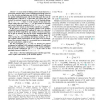Free Online Productivity Tools
i2Speak
i2Symbol
i2OCR
iTex2Img
iWeb2Print
iWeb2Shot
i2Type
iPdf2Split
iPdf2Merge
i2Bopomofo
i2Arabic
i2Style
i2Image
i2PDF
iLatex2Rtf
Sci2ools
108
click to vote
CORR
2006
Springer
2006
Springer
Explicit Space-Time Codes Achieving The Diversity-Multiplexing Gain Tradeoff
A recent result of Zheng and Tse states that over a quasi-static channel, there exists a fundamental tradeoff, referred to as the diversity-multiplexing gain (D-MG) tradeoff, between the spatial multiplexing gain and the diversity gain that can be simultaneously achieved by a space-time (ST) block code. This tradeoff is precisely known in the case of i.i.d. Rayleigh-fading, for T nt + nr - 1 where T is the number of time slots over which coding takes place and nt, nr are the number of transmit and receive antennas respectively. For T < nt + nr - 1, only upper and lower bounds on the D-MG tradeoff are available. In this paper, we present a complete solution to the problem of explicitly constructing D-MG optimal ST codes, i.e., codes that achieve the D-MG tradeoff for any number of receive antennas. We do this by showing that for the square minimum-delay case when T = nt = n, cyclic-division-algebra (CDA) based ST codes having the non-vanishing determinant property are DMG optimal. W...
Related Content
| Added | 11 Dec 2010 |
| Updated | 11 Dec 2010 |
| Type | Journal |
| Year | 2006 |
| Where | CORR |
| Authors | Petros Elia, K. Raj Kumar, Sameer A. Pawar, P. Vijay Kumar, Hsiao-feng Lu |
Comments (0)

